The 10 Healthiest Fruits You Can Eat
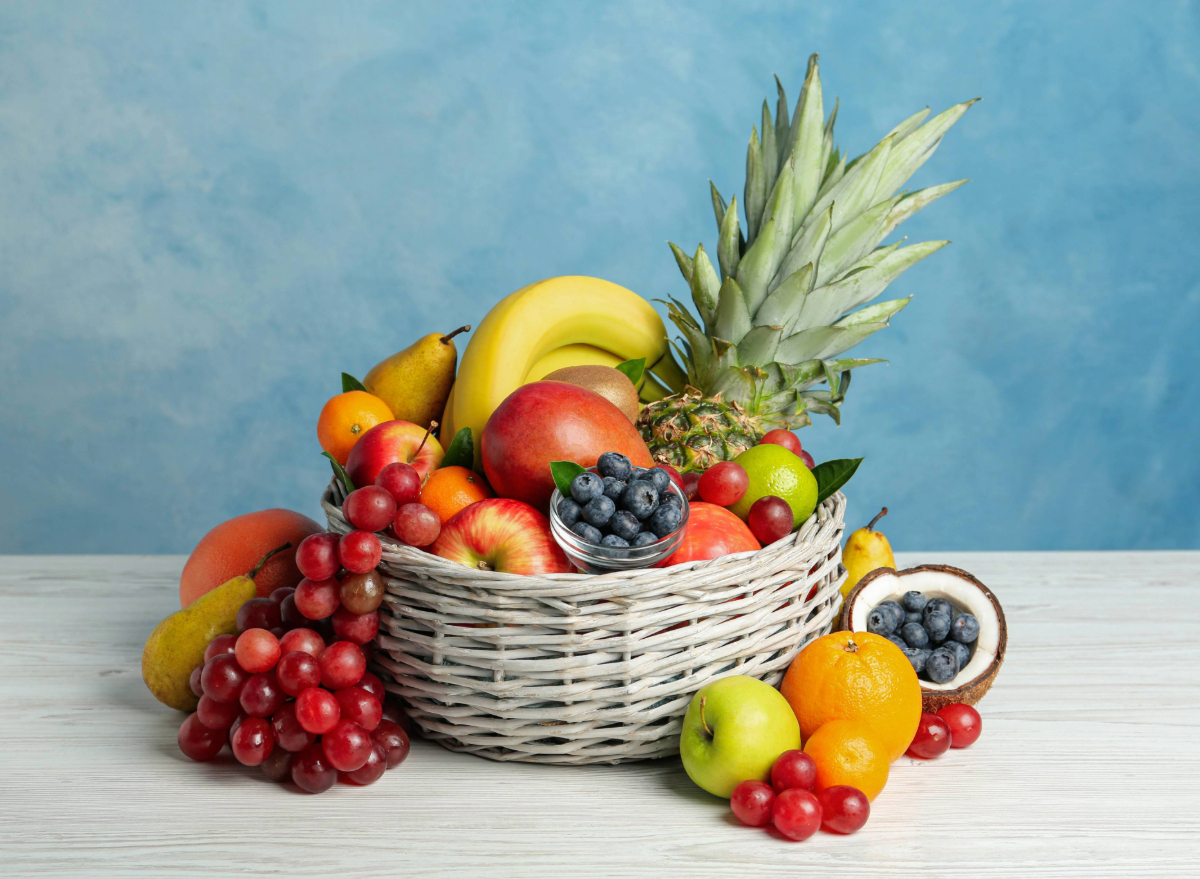
When asked to name the healthiest fruits, it’s a challenging task because all fruits are nutrient powerhouses. Despite their many benefits, most Americans fail to meet the recommended two servings of fruit per day. According to the Centers for Disease Control and Prevention, only 12% of U.S. adults achieve this goal, putting them at greater risk for chronic diseases. Packed with essential vitamins, minerals, fiber, and phytonutrients, fruit is a cornerstone of a balanced diet.
Eating more fruit is one of the simplest and most impactful ways to support overall health, manage weight, and potentially extend your lifespan. Research consistently shows that fruit-rich diets are associated with lower risks of heart disease, obesity, type 2 diabetes, and certain cancers. In fact, doubling produce consumption could reduce cancer rates by 19% and cardiovascular disease by 16%, according to a study in Public Health Nutrition.
Here are the 10 healthiest fruits to add to your meals and snacks—delicious, versatile, and packed with disease-fighting benefits. And for more, check out The 10 Healthiest Vegetables You Can Eat.
The 10 Healthiest Fruits
- Apples
- Blueberries
- Pomegranates
- Oranges
- Strawberries
- Raspberries
- Red Grapes
- Mangos
- Sweet Cherries
- Cantaloupe
Apples
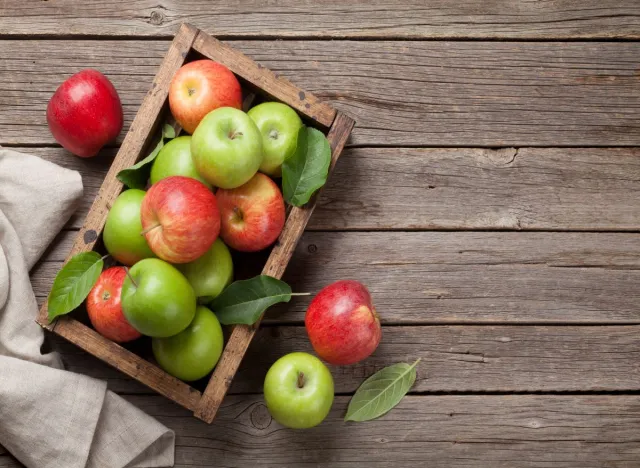
Apples are one of the most popular fruits in the U.S., offering a wealth of health benefits. They’re packed with nutrients like vitamin C, fiber, and powerful antioxidants, including flavonoids and phenolic acids.
Regularly eating apples has been linked to a lower risk of heart disease, with a study published in the American Journal of Clinical Nutrition finding that women who consumed the most apples had a 13-22% reduced risk of cardiovascular disease. In addition to supporting heart health, apples may aid in weight management, reduce the risk of certain cancers, and help protect against asthma, type 2 diabetes, and age-related cognitive decline.
Eat This! Tip: Slice apples into your salads, pair them with nut butter for a satisfying snack, or add them to oatmeal for natural sweetness and fiber. For a healthy dessert, try baking them with a sprinkle of cinnamon, or blend them into smoothies for a refreshing twist.
Blueberries
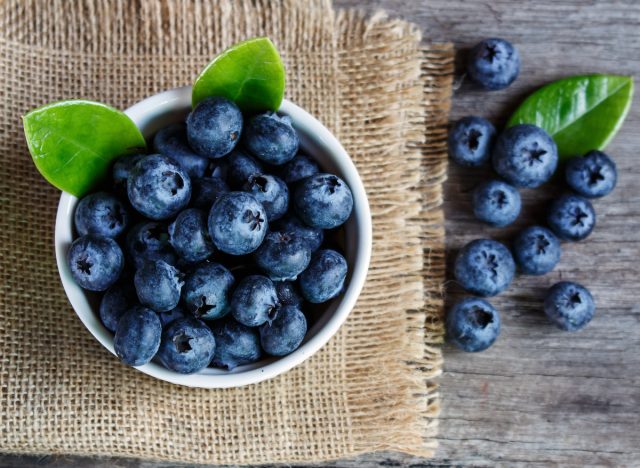
Blueberries are often referred to as a superfruit for their impressive health benefits. They’re packed with anthocyanin antioxidants, which give the berries their vibrant blue color and help reduce the risk of chronic diseases while slowing the aging process.
Several decades worth of research show that eating blueberries frequently can help reduce risk for heart disease, type 2 diabetes, systemic inflammation, glaucoma, and declines in cognition and memory associated with aging, according to research presented in Advances in Nutrition.
Eat This! Tip: Blueberries are a sweet treat on their own but try them on top of salads, cereal, and yogurt and mix them into pancake or muffin batter for a healthy twist. For a quick snack, freeze blueberries and use them in smoothies.
Pomegranates
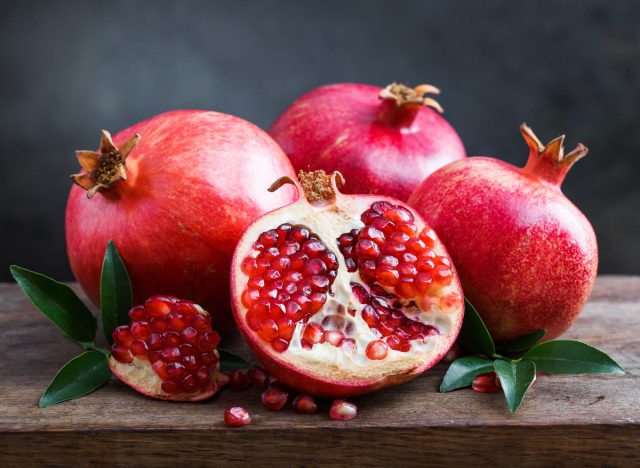
Pomegranates have a history dating back thousands of years and have long been valued for their purported health benefits. They are among the most extensively studied fruits, with over 1,500 published research articles highlighting the health benefits of pomegranate fruit and 100% pomegranate juice.
The ruby-red fruit provides vitamin C, potassium, vitamin K, and bioactive polyphenols that function as powerful antioxidants. Antioxidants help neutralize free radicals—unstable molecules in the body—thereby reducing the risk of certain chronic diseases.
Eat This! Tip: Pomegranates are in season during the winter months. Incorporate their ruby-red arils into salads, yogurt, or oatmeal, or use them to enhance the flavor and color of grain- or vegetable-based dishes. You can also use 100% pomegranate juice as a base for salad dressings, smoothies, or marinades to boost the antioxidants in your favorite dishes.
Oranges
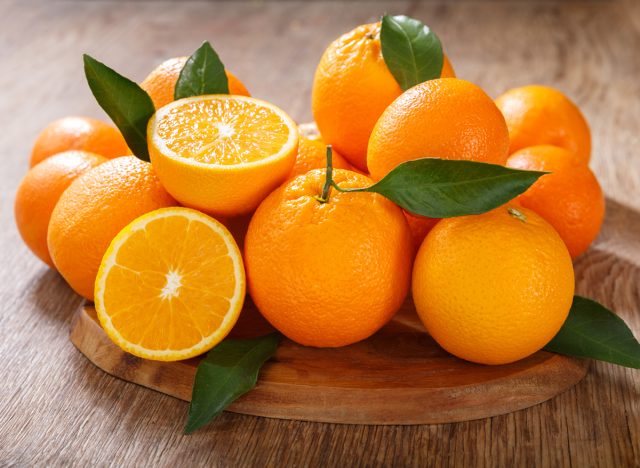
Oranges are packed with essential nutrients, including vitamins C and A, potassium, calcium, fiber, and B vitamins. Studies show that oranges can boost the immune system, improve skin health, and reduce the risk of cardiovascular disease. They also offer anti-cancer, anti-inflammatory, neuroprotective, and anti-aging benefits. A recent review study reported in the journal Nutrients highlights how the unique phytonutrients in citrus may support a healthier gut microbiome.
Eat This! Tip: Enjoy oranges fresh as a snack for a boost of vitamin C and hydration, or add orange slices to salads for a tangy sweetness and extra fiber. You can also use freshly squeezed orange juice in marinades or dressings to up the nutrients and antioxidants without added sugars.
Strawberries
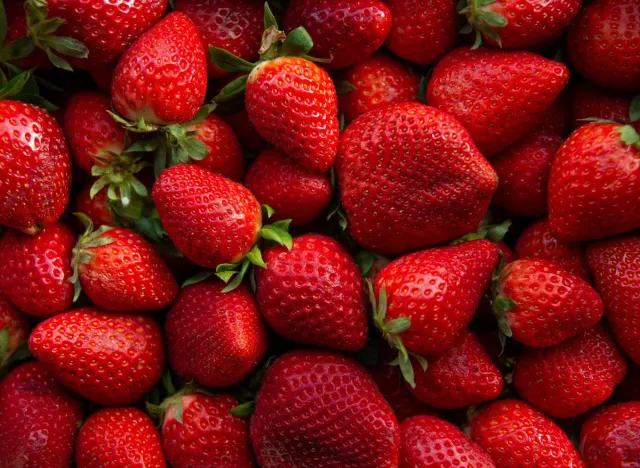
Strawberries are backed by extensive research showing their impressive health benefits. Just one serving of eight strawberries provides more vitamin C than an orange and is packed with antioxidants and essential nutrients like potassium, folate, and fiber.
Strawberries are heart-healthy, aid with weight management, improve the gut microbiome and they have even been shown to help slow cognitive decline. One study conducted at Rush University Medical Center in Chicago found that among older subjects who reported eating the most strawberries were 34% less likely to develop Alzheimer’s Disease during the study period.
Eat This! Tip: Strawberries are a delicious snack on their own or use them on top of hot or cold cereal, in yogurt, salads or dip them in dark chocolate for a healthier dessert.
Raspberries
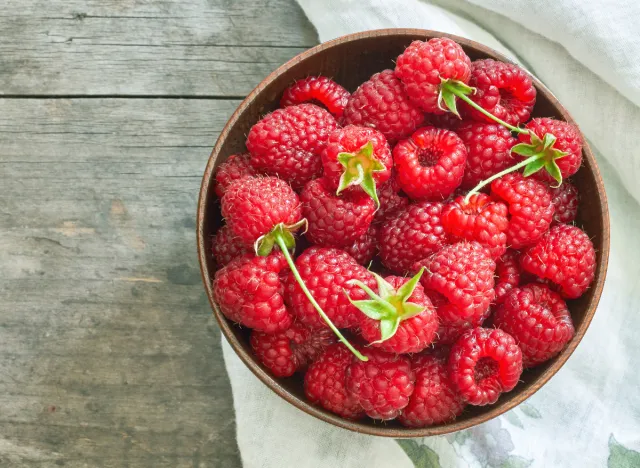
Raspberries are nutrient powerhouses, providing vitamin C, potassium, magnesium, B vitamins, and a wealth of antioxidants. The antioxidants in red raspberries primarily come from ellagic acid, which has shown anti-cancer properties, and anthocyanins, which support heart health and may help protect against heart disease, type 2 diabetes, obesity, and age-related cognitive decline, according to research published in Advances in Nutrition.
A cup of raspberries also packs in 8 grams fiber, more than most other fruits, making them an excellent choice to keep you fuller for longer and to improve your overall GI health.
Eat This! Tip: Sprinkle raspberries over your yogurt, cereal, or oatmeal for a naturally sweet topping, or blend them into smoothies for a refreshing drink. You can also enjoy them as a fresh snack, mix them into salads, or use them to make a homemade raspberry vinaigrette.
Red Grapes

Red grapes are one of the best fruits you can add to your shopping list. These low-calorie fruits provide vitamin K, calcium, fiber, and bioactive flavonoids, which give grapes their vibrant red color.
Research published in the journal Oxidative Medicine and Cellular Longevity highlights the flavonoid resveratrol—also found in blueberries and blackberries—for its powerful benefits. Resveratrol offers anti-inflammatory, cardiovascular protection, anticancer, antidiabetes, antiobesity, neuroprotective, anti-aging, and longevity-promoting properties. The study’s authors suggest that resveratrol may help prevent or mitigate age-related conditions.
Eat This! Tip: Red grapes are versatile and can be incorporated into sweet or savory dishes, from appetizers to desserts. Enjoy red grapes on their own as a snack or add to salads, or roast them and enjoy with cheese on a crostini, or add use to create a Mediterranean-style pizza.
Mangos
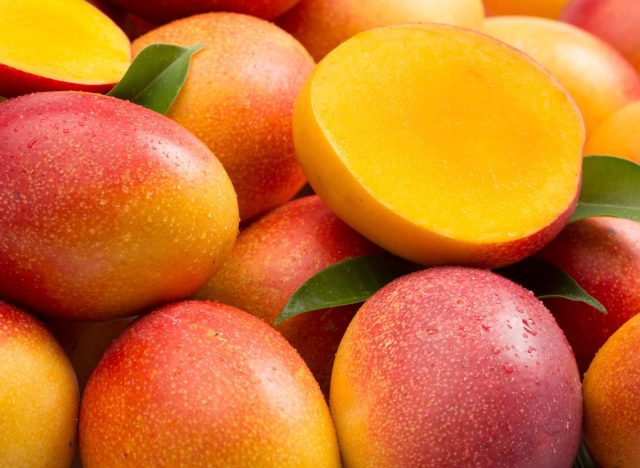
Bursting with over 20 essential vitamins and minerals, mangos offer a wide range of health benefits, from reducing inflammation to lowering the risk of heart disease and type 2 diabetes. Just one cup of fresh mango provides 100% of your daily vitamin C needs, supporting a strong immune system, healthy teeth and gums, and collagen production for resilient skin. Mangos are also rich in fiber, which will help keep you full for longer.
One study reported in Nutrition and Metabolic Insights found that individuals who consumed freeze-dried mango experienced improved blood sugar levels, suggesting the fruit may aid in managing glucose levels.
Eat This! Tip: Enjoy fresh mango slices as a snack or blend it into smoothies for a tropical twist. You can also dice it into salads, use it as a topping for yogurt or oatmeal, or incorporate it into salsas and marinades for a flavorful boost.
Sweet Cherries
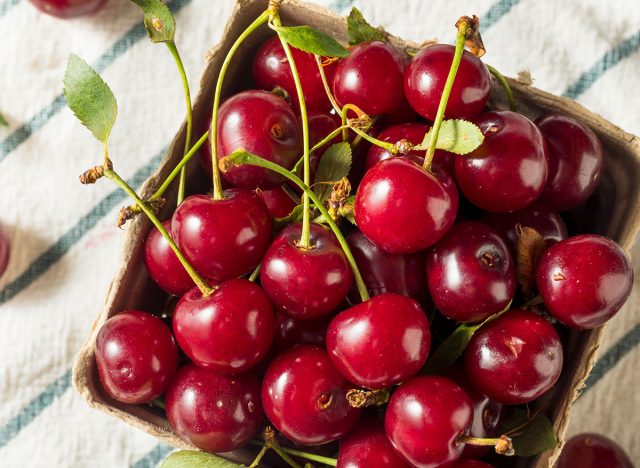
Sweet cherries are rich in fiber and potassium while being naturally low in calories, with just 100 calories per cup. Their deep red color comes from anthocyanins, powerful compounds that offer numerous health benefits. According to a review published in Nutrients, anthocyanins may help reduce pain and inflammation, improve sleep, lower markers associated with heart disease and type 2 diabetes, and combat inflammation throughout the body.
Eat This! Tip: Enjoy them fresh as a snack, or pit and add them to smoothies, yogurt, or oatmeal for natural sweetness. You can also bake them into pies, muffins, or crisps, or freeze them for a refreshing, icy treat on hot days.
Cantaloupe
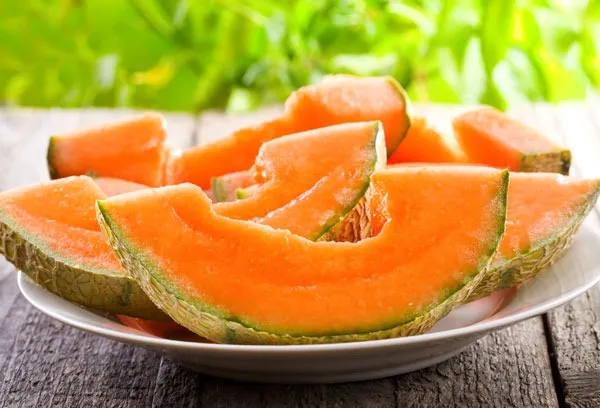
Cantaloupe is one of the healthiest fruits you can add to your diet. One cup has just 50 calories while providing fiber, potassium, vitamin C, folate, vitamin K, calcium, magnesium, lutein, zeaxanthin, and beta-carotene, according to the USDA. With about 90% water content, cantaloupe is hydrating and filling. It also delivers heart-healthy nutrients and contains lutein and zeaxanthin—carotenoids that may help protect against age-related macular degeneration, the leading cause of blindness in older adults.
Eat This! Tip: Cantaloupe is a hydrating snack or try blending cubes into smoothies for a naturally sweet boost. You can also pair cantaloupe with cottage cheese or Greek yogurt for a protein-packed snack, or toss it into fruit salads.
Bottom Line
Each of these fruits offers unique health benefits, making them an essential part of a balanced diet. Incorporate a variety of colorful fruits into your meals and snacks to obtain the most health and nutritional benefits.
- Source: https://www.cdc.gov/mmwr/volumes/71/wr/mm7101a1.htm
- Source: https://www.cambridge.org/core/journals/public-health-nutrition/article/fruits-and-vegetables-in-the-prevention-of-cancer-and-cardiovascular-disease/B441A5EBF2F1642899BFC399FAA18978
- Source: https://pubmed.ncbi.nlm.nih.gov/31329250/
- Source: https://pmc.ncbi.nlm.nih.gov/articles/PMC4007340/
- Source: https://pubmed.ncbi.nlm.nih.gov/31252646/
- Source: https://pubmed.ncbi.nlm.nih.gov/25210462/
- Source: https://fdc.nal.usda.gov/food-details/746770/nutrients









